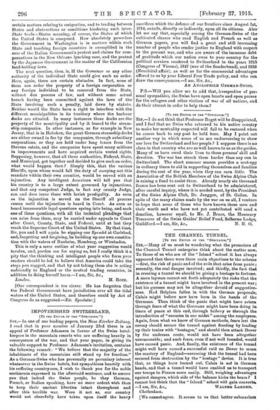THE NEW "DAY" AND MERCHANT SHIPPING.
[To vas EDITOR or TN. SPSCIA70.1 SIR,—In your article of the 13th inst.," The New Day' and Merchant Shipping," you make the suggestion that America would only have to say to Germany "If you oink our ships, we can no longer grant hospitality to yours ... we shall order every one of your interned vessels to leave in forty-eight hours, &c." Now that is a very fine suggestion, and I have no doubt your publishing of it will make a good many people think that America ought to do that, and that they will be correspondingly disappointed if America, fails to do so. I would like, therefore, to point out to you that, fine as the suggestion is on paper, it is an utter impossibility to bare carried out in practice.
The United States are governed under certain complex arrangements but little understood by Europeans, used to a central authority, capable of exercising that authority in all directions. Now in the United States who would have the authority to order all these vessels, voluntarily interned by their owners in the harbours of New York, Jersey City, Boston, Philadelphia, Norfolk, Baltimore, Savannah, Charles. ton, New Orleans, Galveston, San Francisco, Portland. Seattle, and many more ? Each of the harbours mentioned is situated in different free and self-governing States. Certainly not the President, nor any other Federal authority, as the theory of State rights (see any history of the Civil War) gives to each State the rights over all the territory within its borders, including harbours and waters. The Federal Government has no control over these, except in
certain matters relating to emigration, and to trading between States and obstructions or conditions hindering snch inter- State trade—States meaning, of course, the States of which the United States is composed. How absolutely powerless the Government in Washington is in matters within each State and touching foreign countries is exemplified in the ease of the Italian Government's protest and claims for com- pensations in the New Orleans lynching ease, and the protest by the Japanese Government in the matter of the Californian land-holding laws.
The next question, then, is, If the Governor or any other authority of the individual State could give such an order. Here, again, there are certain obstacles. In fact, none of them can order the property of a foreign corporation or any foreign individual to ho removed from the State, without due process of law, and without some actual breach having been committed against the laws of the State involving such a penalty, laid down by statnte. Neither would the State have a right to interfere with the different municipalities in its territory where the harbour docks are situated. In many instances these docks are the property of the municipality and by it leased to the steam- ship companies. In other instances, as for example in New Jersey, that is in Hoboken, the great German steamship docks are either owned in fee by the companies, through subsidiary corporations, or they are held under long leases from the Stevens estate, and the companies have spent many millions in improvements and have acquired certain vested rights. Supposing, however, that all these authorities, Federal, State, and Municipal, got together and decided to give such an order, what would happen then ? Simply this, that the various Sheriffs, upon whom would fall the duty of carrying out this mandate within their own counties, would be served with an injunction. Any intelligent American will tell you that his country is to a large extent governed by injunctions, and that any competent Judge, in fact any county Judge, can and does issue these with lavish prodigality. As soon as the injunction is served on the Sheriff all process ceases until the injunction is heard in Court. As soon as heard innumerable legal questions spring into being, and each one of these questions, with all the technical pleadings that can arise from them, may be carried under appeals to Court after Court, County, State, and Federal, until at last they reach the Supreme Court of the United States. By that time, Sir, you and I will again be sipping oar Spradd at Carlsbad, and, forgetting and forgiving, be building up our own constitu- tion with the waters of Nanheim, Homburg, or Wiesbaden.
This is only a mere outline of what your suggestion would involve, and, pardon me for saying so, but I really think it a pity that the thinking and intelligent people who form your readers should be led to believe that America could take the steps you suggest, and that by not taking them she is siding unfriendly to England or the neutral trading countries, in addition to doing herself harm.—I am, Sir, &c., [Our correspondent is too clever. He has forgotten that the Federal Government have jurisdiction over all the tidal waters of the United States, and therefore could by Act of Congress do as suggested.—En. Spectator.]



































 Previous page
Previous page